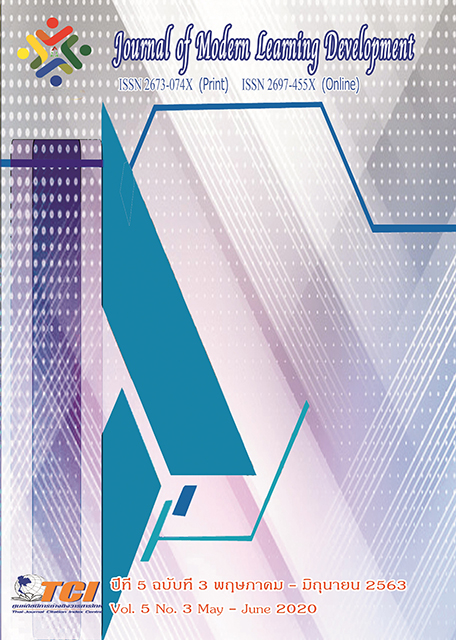The Influencing Factors for Study Decision of the Undergraduate Students at the Faculty of Social Technology Kalasin University
Main Article Content
Abstract
The main purpose of this research to study: 1) the relative factor with study decision of the undergraduate students at the faculty of social technology Kalasin University, 2) the influencing factor for study decision of the undergraduate students, and 3) the suggestion about the study decision of the undergraduate. This was mixed method of a quantitative and qualitative approach. The quantitative approach which the samples was the undergraduate students at the faculty of social technology Kalasin University about 155 peoples, used stratified random sampling. The research tool for data collection was a questionnaire. The statistics in data analysis were frequency, percentage, mean, standard deviation, multiple correlation analysis and multiple regression analysis. The qualitative approach which the target group were the lecturer and students of each branch about 14 peoples. The research tool for data collection was the interview and content analysis. The findings were as follows:
1.The relative factors with study decision of the undergraduate students at the faculty of social technology Kalasin University statistically significant at the .05 level were branch, faculty characteristics, program, lecturer, learning and teaching management, cost and location.
2.The influencing factors for study decision of the undergraduate students at the faculty of social technology Kalasin University were branch, learning and teaching management, location, alumni public relation and cost in education.
3.The suggestions about the study decision of the undergraduate students at the faculty of social technology Kalasin University were: 1) the goal was lecturers were knowledge, experience in branch to provide opportunities for students to developed students with a stable career. The importance of the family of students was important to created motivation in development oneself and looked for opportunities to work. 2) The belief and value was portfolio or present the movement of teaching to be recognized and accepted in society. The lecturer should go to suggest the knowledge about education. 3) The expectations were they should create experience, knowledge and new opportunities in learning to practice in class and outside. 4) The knowledge and ability were they should be a direct experience and practice to had skill from the right professional knowledge to able analyzed oneself. 5) The influence of society was they should look at the benefits to themselves, family, and society and to build confidence to the people around by thinking, doing, developing and creating a career.
Article Details
References
กระทรวงศึกษาธิการ. (2553). พระราชบัญญัติการศึกษาแห่งชาติ พ.ศ. 2553. ออนไลน์.สืบค้นเมื่อ17มีนาคม 2563.แหล่งที่มา: https://www.mwit.ac.th/~person/01-Statutes/NationalEducation.pdf
กัญนิกา พราหมณ์พิทักษ์. (2542). การบริหารการศึกษา. กรุงเทพมหานคร: กรุงสยามการพิมพ์.
ใจชนก ภาคอัต. (2556). ปัจจัยด้านการพัฒนาคุณภาพของสถาบันที่มีผลต่อการตัดสินใจเข้าศึกษาต่อของนักศึกษาระดับปริญญาโท สถาบันบัณฑิตพัฒนบริหารศาสตร์. งานวิจัยสถาบันบัณฑิตพัฒนบริหารศาสตร์. บัณฑิตวิทยาลัย: สถาบันบัณฑิตพัฒนบริหารศาสตร์.
บุญชม ศรีสะอาด. (2554). การวิจัยวิจัยเบื้องต้น. กรุงเทพมหานคร: สุวีริยาสาสน์.
อุทุมพร ไวฉลาด และจงดี โตอืม. (2559). ปัจจัยที่มีผลต่อการตัดสินใจศึกษาต่อระดับบัณฑิตศึกษาคณะสิ่งแวดล้อมและทรัพยากรศาสตร์ มหาวิทยาลัยมหิดล. วารสารบัณฑิตศึกษา มหาวิทยาลัยราชภัฏวไลยอลงกรณ์ ในพระราชูปถัมภ์,10 (2),165-177.
Krejcie, R.V., & Morgan D.W. 1970. Determining sample size for research activities. Education and Psychology Measurement,30(3), 607-608.


